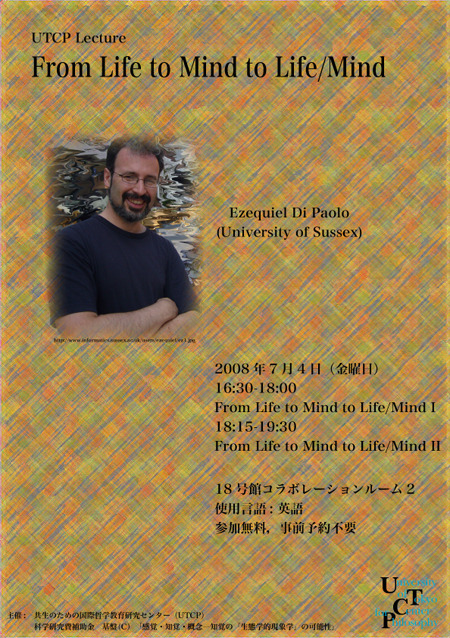
|
Title: | From Life to Mind to Life/Mind終了しました |
||
|---|---|---|---|---|
| Date: | 2008年7月4日(金) 16:30-19:30 |
Place: | 東京大学駒場キャンパス18号館4階 コラボレーションルーム2 [地図] |
|
講演者: Ezequiel Di Paolo (University of Sussex)
使用言語: 英語 入場無料、事前登録不要
⇒[報告]
講演概要:
The enactive approach to cognition is a form of non-reductive naturalism. The core ideas of this approach (autonomy, experience, emergence, embodiment and sense-making) form a tight conceptual bundle. However, the enactive "story" is at its most radical if told from the starting point of autonomy. With this idea alone, enactivism confronts head-on a key challenge in contemporary cognitive science: the problem of identity. I will provide a definition of an autonomous system and show some of its practical implications. Autonomous dynamics crop up not only in the sustained processes of metabolism, but also at different levels (neural, sensorimotor, behavioural and social), with different durations (from transient neural activity, and goal-directed behaviour to sustained games, conversations, and careers), and possible conflicts.
Hans Jonas has described a story of transitions in forms of value-makin g: in animality, the use of vision and the construction of images. How are these transitions best understood from a systemic point of view? I will propose that theories of biological organization (such as autopoiesis) give us only a departure point for this understanding, and that they require a critical evaluation so as to make explicit what other properties make the transitions from metabolism to agency possible. I will illustrate some of these point with the use of recent models and experiments and finally conclude that agency redefines metabolism, overcoming autopoiesis itself and conserving it. In this way the transition from life to mind is but the first move on way towards a new form of living: life/mind.







